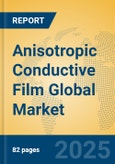Key trends include the development of fine-pitch ACFs for high-resolution and foldable displays, low-temperature curing formulations for flexible electronics, and eco-friendly adhesives to meet stringent environmental regulations. The market is propelled by the proliferation of smart devices, advancements in semiconductor packaging, and the growing adoption of flexible display technologies.
Market Size and Growth Forecast
The global Anisotropic Conductive Film market was valued at USD 1.1-1.7 billion in 2024, with an estimated CAGR of 6.0%-8.0% from 2025 to 2030, driven by increasing demand for miniaturized electronics and advanced interconnect solutions.Regional Analysis
- North America is projected to grow at a CAGR of 5.8%-7.8%, with the U.S. leading due to its robust electronics manufacturing sector and innovations in 5G and automotive electronics, focusing on high-performance ACFs for fine-pitch applications.
- Europe is expected to achieve a CAGR of 5.5%-7.5%, with Germany driving demand through its focus on sustainable and lead-free ACFs for automotive and industrial electronics.
- Asia Pacific is anticipated to record the highest growth at 6.5%-8.5%, led by China, Japan, and South Korea, where consumer electronics and display manufacturing fuel ACF demand, with trends toward cost-effective and high-reliability solutions.
- Rest of the World, particularly Brazil, is expected to grow at 5.2%-7.2%, with trends toward smart card and industrial electronics applications.
Application Analysis
- FPDs applications are estimated to grow at a CAGR of 6.5%-8.5%, driven by ACF’s use in LCD and OLED displays, with trends favoring fine-pitch connections for high-resolution and foldable screens.
- Automotive applications are projected to expand at 6.2%-8.2%, supported by ACF’s role in advanced driver-assistance systems (ADAS) and electric vehicle electronics, with innovations in thermal stability.
- Smart card applications are expected to grow at 5.8%-7.8%, as ACF supports compact and secure chip connections, with trends toward contactless payment systems.
- Touch panel applications are anticipated to rise at 6.0%-8.0%, driven by demand for smartphones and tablets, with advancements in low-temperature curing ACFs.
- Other applications, including medical and wearable devices, are projected to grow at 5.5%-7.5%, focusing on flexible and reliable interconnects for emerging technologies.
Key Market Players
3M, based in St. Paul, Minnesota, USA, is a global leader in ACF production, offering solutions for FPDs and automotive electronics, known for its innovative adhesive technologies and sustainable practices.Dexerials, headquartered in Tokyo, Japan, specializes in ACFs for display and semiconductor applications, emphasizing fine-pitch and high-reliability solutions for advanced electronics.
Resonac, based in Tokyo, Japan, provides ACFs for touch panels and automotive systems, focusing on environmentally friendly formulations and high-performance interconnects.
H&SHighTech Corp., based in South Korea, produces ACFs for consumer electronics and smart cards, known for its cost-competitive and scalable manufacturing processes.
Kukdo Chemical, headquartered in Seoul, South Korea, offers ACFs for industrial and display applications, emphasizing high-quality and innovative adhesive solutions.
Porter’s Five Forces Analysis
- The threat of new entrants is low; high R&D costs, technical expertise, and established supply chains create significant barriers, limiting new competitors in the ACF market.
- The threat of substitutes is moderate; alternative interconnect solutions like soldering or conductive pastes compete, but ACF’s precision and reliability in fine-pitch applications maintain its edge.
- Buyer power is moderate; large electronics manufacturers negotiate pricing, but ACF’s specialized role in high-density interconnects limits buyer leverage.
- Supplier power is low; raw materials like conductive particles and resins are widely available, reducing supplier influence in the ACF market.
- Competitive rivalry is high; key players differentiate through innovation in fine-pitch ACFs, sustainable formulations, and application-specific solutions.
Market Opportunities and Challenges
Opportunities:
- Rising demand for 5G infrastructure drives ACF adoption in high-frequency electronics.
- Advancements in flexible and foldable displays enhance ACF market growth.
- Emerging markets in Asia Pacific offer expansion opportunities due to electronics manufacturing growth.
Challenges:
- High production costs limit ACF adoption in cost-sensitive applications.
- Regulatory scrutiny on adhesive chemicals increases compliance costs.
- Complexity of fine-pitch manufacturing hinders scalability for niche applications.
Growth Trend Analysis
The Anisotropic Conductive Film market is experiencing steady growth, driven by demand for advanced interconnect solutions in consumer electronics and automotive sectors. On January 31, 2024, Dexerials Corporation announced the extension of its Kanuma Plant 1, with construction of a new plant beginning on September 17, 2024, aimed at increasing ACF production capacity to meet rising demand, with operations expected to start within fiscal 2026. This expansion reflects the growing need for high-performance ACFs in display and semiconductor applications, aligning with a projected CAGR of 6.0%-8.0% through 2030.This product will be delivered within 1-3 business days.
Table of Contents
Companies Mentioned
- 3M
- Dexerials
- Resonac
- H&SHighTech Corp.
- Kukdo Chemical








